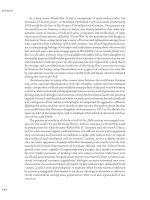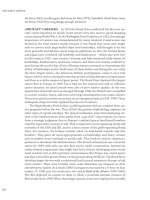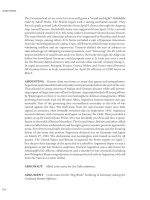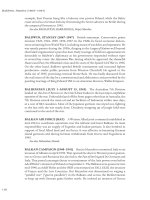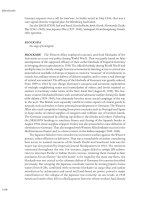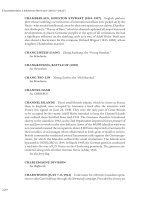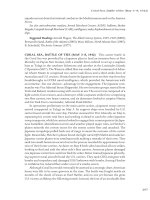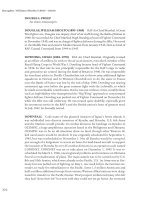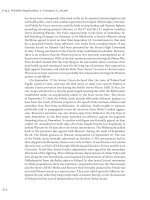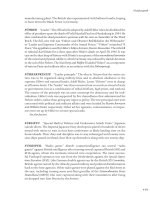The concise encyclopedia of world war II 2 volumes (greenwood encyclopedias of modern world wars) ( PDFDrive ) 193
Bạn đang xem bản rút gọn của tài liệu. Xem và tải ngay bản đầy đủ của tài liệu tại đây (73.54 KB, 1 trang )
Baldwin, Stanley (1867–1947)
example, East Prussia hung like a balcony over prewar Poland, while the Baltic
coast served as a German balcony threatening the Soviet advance on Berlin during
the conquest of Germany in 1945.
See also BAGRATION; BARBAROSSA; Pripet Marshes.
BALDWIN, STANLEY (1867–1947) British statesman. Conservative prime
minister 1923, 1924–1929, 1936–1937. In the 1920s he faced economic dislocations stemming from World War I, including issues of war debts and reparations. He
was mostly passive during the 1930s, clinging to the League of Nations well beyond
that failed organization’s past due date. Early tracings of full-bore appeasement are
detectable in Baldwin’s diplomacy as his government responded without vigor
to several key crises: the Abyssinian War, during which he approved the shameful
Hoare-Laval Pact; the Rhineland crisis; and the start of the Spanish Civil War in 1936.
On the other hand, Baldwin speeded British rearmament and increased fighter
production—under public pressure from Winston Churchill. He agreed to the
India Act of 1935, promising eventual Home Rule. He was badly distracted from
the real issues of the day by a constitutional and abdication crisis provoked by the
pending marriage of King Edward VIII to an American divorcee, Wallis Simpson.
BALIKPAPAN ( JULY 1–AUGUST 15, 1945) The Australian 7th Division
landed on this bit of Borneo in the Dutch East Indies in the last major amphibious
operation of the war. Unheralded and off the front pages other than in Australia, the
7th Division retook the main oil and air facilities of Indonesia within nine days,
at a cost of 863 casualties. Most of the Japanese garrison was wiped out, fighting
to the last with the war nearly done. Desultory mopping up of jungle hold-outs
continued to the end of the war.
BALKAN AIR FORCE (BAF) A Western Allied joint command established in
mid-1944 to coordinate operations over the Adriatic and lower Balkans. Its main
responsibility was air supply of Yugoslav and Italian partisans. It also bombed in
support of local Allied land and sea forces. It was effective in harassing German
island garrisons and during German withdrawals from Greece and Yugoslavia in
1945.
See also Dalmatian Islands.
BALKAN CAMPAIGN (1940–1941) Benito Mussolini committed Italy to an
invasion of Albania in April 1939. That opened the door to Western power guarantees to Greece and Rumania but also led to the Pact of Steel signed by Germany and
Italy. That posed a strategic threat to containment of the Axis powers even before
Adolf Hitler’s invasion of Poland on September 1. The Balkans were quiescent into
mid-1940, as Adolf Hitler and the OKH concentrated on FALL GELB, the invasion
of France and the Low Countries. But Mussolini was determined on waging a
“parallel war” (“guerra parallela”) in the Balkans and across the Mediterranean
to keep up with German gains farther north. He ordered an invasion of Greece
116
